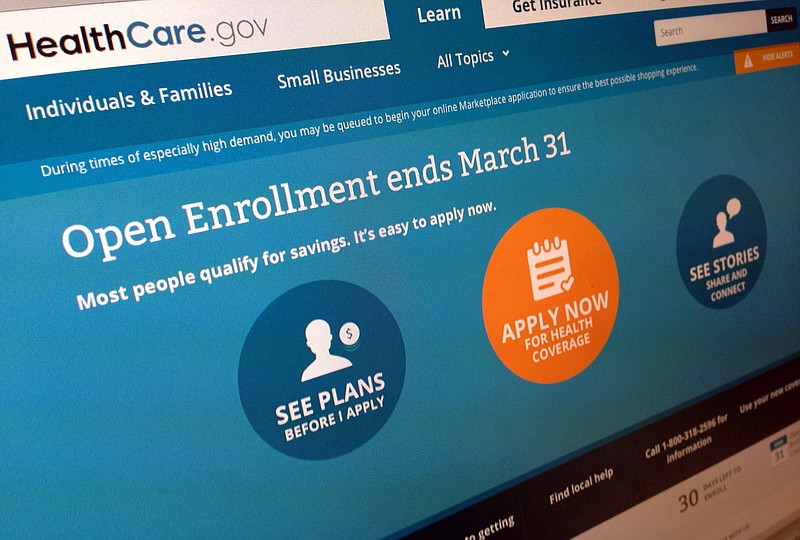Who qualifies for subsidies?
1 person: household income under $47,5202 people: household income under $64,0803 people: household income under $80,6404 people; household income under $97,2005 people: household income under $113,7606 people: household income under $130,320Source: Department of Health and Human Services
Despite record increases in individual health insurance rates planned for 2017, most Tennesseans should still be able to buy health care coverage for under $100 a month next year by shopping around for the cheapest plan and taking advantage of federal tax subsidies, according to a new government study.
An analysis released Wednesday by the Department of Health and Human Services estimates that 81 percent of consumers in Tennessee will pay under $75 a month - and 83 percent will pay $100 or less monthly - to buy individual health insurance through the ObamaCare marketplace in 2017, even after hefty rate increases by the three major health insurers still offering individual plans in the marketplace exchange. Federal subsidies will go up along with higher insurance premiums next year, which state regulators approved this week for major insurers varying from 44 percent to 62 percent in Tennessee.
"Headline rate increases do not reflect what consumers actually pay," said Kathryn Martin, acting assistant secretary for planning and evaluation with Health and Human Services. "Our study shows that, even in a scenario where all plans saw double digit rate increases, the vast majority of consumers would continue to have affordable options."
That's because the Affordable Care Act signed into law by President Obama in 2010 provides subsidies to help most low- and moderate-income individuals pay for their insurance as a share of their income. Although the government will have to shoulder a bigger share of the costs of the marketplace plans to pay for a higher level of subsidies, most individuals won't have to absorb all of the increases.
As of March 2016, for instance, there were 9.4 million people receiving premium subsidies through the exchanges. Those subsidies average $291 per month, or over 75 percent of the $386 per month average premium (before subsidies) for people who get coverage through Healthcare.gov, according to Healthinsurance.org.
On Tuesday, the Tennessee Department of Commerce and Insurance approved average rate increases for individual health insurance plans of 62 percent from Blue- Cross BlueShield of Tennessee, 46.3 percent for Cigna and 44.3 percent for Humana policies.
The increases for 2017 follow raises between 5 and 37 percent on such plans in 2016. Such increases are making health care unaffordable for many, according to Tennessee's Republican senators.
U.S. Sen. Lamar Alexander, R-Tenn., the chairman of the Senate health committee and a long-time critic of Obamacare, said the program is too expensive and "cannot be allowed to continue." Following an appearance at the Chattanooga Area Chamber of Commerce annual meeting Wednesday, U.S. Sen. Bob Corker, R-Tenn., said health care through the Affordable Care Act is not sustainable and that "massive changes" will have to be made.
"What we're seeing in the exchanges is you have a much sicker population who are entering," he said. "It's sending costs through the roof."
Corker said that what needs to be done is to "transition to something else. It's got to be replaced with something else."
But in a news briefing Wednesday with reporters, HHS officials pushed back against such criticism. The rate increases approved for this year, for instance, didn't force most consumers in Tennessee to pay a lot more for coverage.
"Last year, despite headlines projecting double-digit rate increases, the average premium increased just $4 per month for HealthCare.gov consumers with tax credits, and seven out of 10 Marketplace consumers could purchase 2016 coverage for less than $75 per month," HHS said in its study.
Consumers also can shop around among competing plans under Obamacare.
"We have a vibrant marketplace where people can come and shop online and look for what best fits their needs," Martin said.
Last year, more than 43 percent, or 60,325 returning Tennessee HealthCare.gov consumers, switched plans. They saved an average of $52 per month, Martin said.
However, next year in Tennessee, 57 counties will have only one health insurer and only 38 of the state's 95 counties will have more than two providers. The state's cooperative plan, Community Health Alliance, shut down last year, and the nation's biggest health insurer, United Healthcare, exited the Tennessee marketplace after only a year.
Even with an average 62 percent rate increase approved for its 2017 plans, BlueCross also says it is still studying whether the risks are too great to continue with its individual coverage plans in 2017 under the marketplace. BlueCross will announce next month whether it will continue to participate in the marketplace exchange in 2017.
Ben Wakana, deputy assistant secretary for public affairs for HHS said the overall cost of the Affordable Care Act is still below what the Congressional Budget Office projected when the law was drafted, although next year's jump in rates could push rates in Tennessee above those levels.
Most people in Tennessee and the vast majority of those with plans from BlueCross and Cigna are covered by employer-sponsored plans, while many other Tennesseans are enrolled in Medicare and Medicaid plans not directly affected by the dramatic rate increases approved for individual plans for 2017.
Martin said since the Affordable Care Act became law, health care prices overall have risen at the lowest rate in 50 years, even with the dramatic increases planned by the health insurers for the marketplace plans.
"The Marketplace is providing 231,705 Tennessee consumers with coverage they value, because it improves their access to care and financial security," Martin said.
Deputy Business Editor Mike Pare contributed to this report.
Contact Dave Flessner at dflessner@timesfree press.com or at 423-757-6340.
